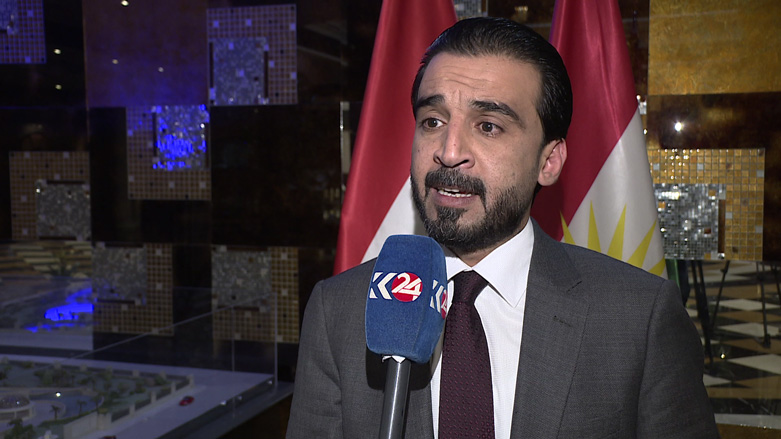Iraqi Parliamentary Speaker says Baghdad to build 'true partnership' with Kurdistan Region

ERBIL (Kurdistan 24) – Iraqi Parliamentary Speaker Mohammed al-Halbousi recently visited the semi-autonomous Kurdistan Region and met with senior Kurdish leaders to discuss key issues related to the disputed province of Kirkuk, Kurdistan’s national budget share, and Erbil-Baghdad relations.
Halbousi on Thursday night landed in Erbil and met with the Prime Minister of the Kurdistan Region, Nechirvan Barzani, Chancellor of the Kurdistan Region Security Council (KRSC), Masrour Barzani, and the President of the leading Kurdistan Democratic Party (KDP), Masoud Barzani, as well as Yezidi (Ezidi) leaders.
In an exclusive interview with Kurdistan 24, Halbousi delved deeper into the subjects discussed with the Kurdish leaders.
MEETING WITH KURDISH LEADERS
“In our meetings, we spoke of how parties should truly represent the people of the Kurdistan Region and Iraq,” Halbousi began.
The Iraqi national elections held in May was marred by a considerably low turnout and new parties and coalitions emerged at the top, with no one political block able to secure an absolute majority in the 329-seat Parliament of Iraq.
Tying into proper and effective representation, Halbousi discussed the current situation regarding displaced people residing in the Kurdistan Region. “We all agreed that Erbil and Baghdad should work together to help those displaced return to their liberated hometowns,” Halbousi noted.
Indeed, the Kurdistan Region is home to 1.5 million Iraqi displaced people and Syrian refugees, most of whom fled from the threat of the Islamic State (IS) and violence over the past few years.
KIRKUK
The issue of the disputed and ethnically diverse province of Kirkuk was raised in Halbousi’s meetings, he confirmed.
“Kirkuk should be run by its people, administratively and military wise. The security of Kirkuk should be managed by the federal government of Iraq, in cooperation with the Kurdistan Regional Government (KRG),” he argued.
Kurdish officials over the past year have repeatedly criticized the current handling of the oil-rich province’s security, namely following the attack and military takeover of Kirkuk by Iraqi forces and Shia militias. On Oct. 16, 2017, Kurdish Peshmerga forces, who had been protecting Kirkuk from IS attacks since 2014, were driven out, creating a security vacuum.
The province has since witnessed an increasing number of insurgency attacks, kidnappings, and general unrest.
Kurds have refused to recognize the current status in Kirkuk, where the elected governor was ousted, Kurdish political party offices were turned into militia bases, and Kurdish provincial administrators were deliberately replaced as part of a “systematic Arabization campaign,” leading many to describe Kirkuk as being under “military rule.”
THE FEDERAL BUDGET OF THE KURDISTAN REGION
Among other disagreements between Erbil and Baghdad, Halbousi was also asked about the 2019 federal budget bill, which the Kurdistan Regional Government (KRG) strongly opposed after its share of the federal budget dropped from 17 percent to 12.
“[The bill] should be reviewed, and the share allotted to the Kurdistan Region must be increased,” Halbousi concurred. “For this reason, a committee led by Fuad Hussein [Kurdish federal Minister of Iraqi Finance and Economy] has been formed to protect the rights and entitlements of the Kurdistan Region.”
The Iraqi Speaker added that he would “like to say” that this year, “we will reach a permanent agreement with the Kurdistan Region regarding its share of the budget,” to avoid revisiting the subject “every year.”
NEW KRG CABINET
Halbousi, when asked about the current government formation in the Kurdistan Region, noted he would support whoever is nominated for the post of Prime Minister.
The KDP recently nominated Masrour Barzani to head the new KRG cabinet, and the incumbent Prime Minister Nechirvan Barzani is reportedly set to hold the Presidency of the Kurdistan Region.
“Masrour Barzani played an important role in the political and security situation in the Kurdistan Region. We would strongly support his bid,” Halbousi explained.
The KDP has already started to meet with other Kurdish parties to form a new cabinet, in which the party will likely dominate most of the key posts as it secured 45 seats out of 111 possible ones in the Kurdistan Region Parliament.
ERBIL AND BAGHDAD RELATIONS
During his visit, Halbousi enthusiastically promoted the fact that officials from Erbil and Baghdad have indicated they would like to restore and develop ties in all sectors, as well as address political disagreements.
“We will work to develop bilateral relations to go beyond a dialogue between Erbil and Baghdad,” he stressed, adding he would like to see “a true partnership” develop.
Tensions between the two governments reached its zenith in late 2017 following the referendum on independence in the Kurdistan Region and Baghdad’s military takeover of constitutionally disputed areas. However, since the formation of a new federal government of Iraq, political relations have begun to normalize.
Editing by Nadia Riva
(Blessa Shaweys conducted the interview)
